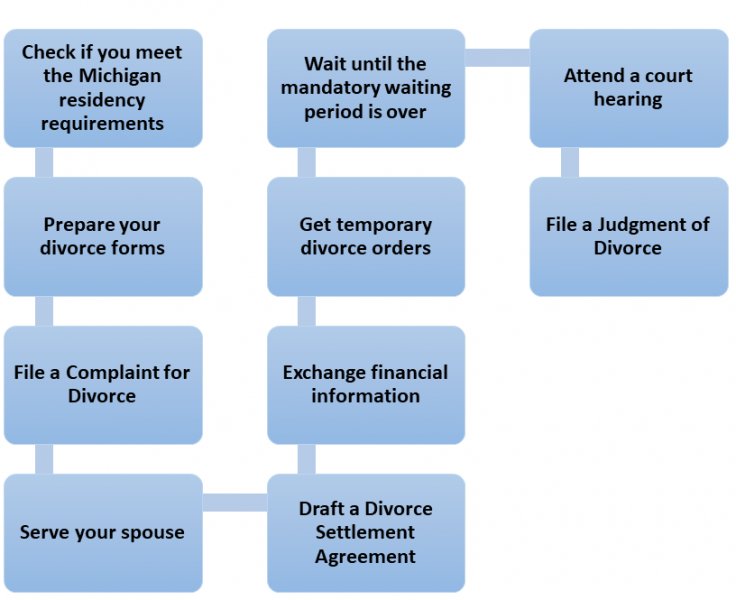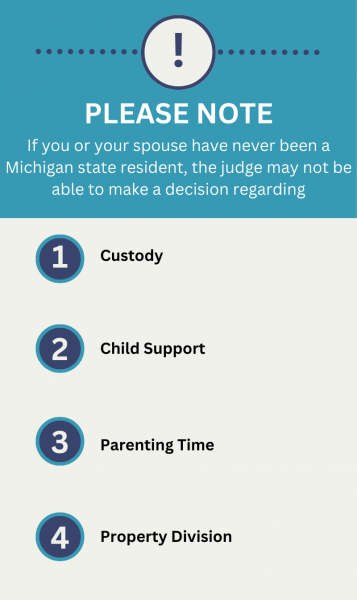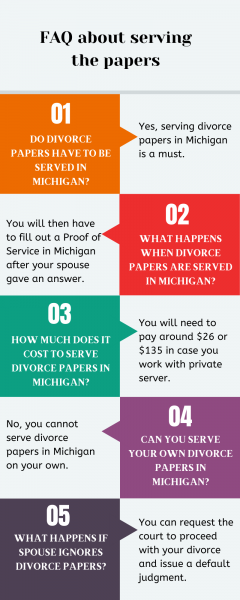When the couple arrives at the decision to end a marriage, they often feel confused as to where to begin. The process of divorce in Michigan largely depends on a specific family situation that would allow the spouses to either file for a contested or uncontested marriage dissolution. If you and your spouse contest each other’s financial, property, and child-related decisions, you will need legal assistance and, potentially, multiple court appearances, which will cost you thousands of dollars.
An uncontested divorce procedure in Michigan is generally not that long or expensive and lasts less than a contested one. So, if you do not have any disagreements with your spouse concerning the details of your divorce, you can get your case finalized in 10 steps.
If you seek to figure out how does divorce work in Michigan, you can get all the needed information as well as the timeline of divorce in Michigan in this article. In general, all the steps for marriage dissolution are illustrated in this Michigan divorce flowchart. Read on to find out about each separate step in greater detail and check the list of things to do before divorce.

Step 1: Check if You Meet the Residency Requirement
To start a divorce in Michigan, you need to make sure that the MI court has jurisdiction over your case. For this, you need to meet the residency requirement.

How Long Do You Have to Be a Michigan Resident to File for Divorce?
According to Michigan laws, you or your spouse must have lived in the state for 6 months (180 days) before you start the filing process. Besides, either of you must be a county resident for at least 10 days if you plan to file there. If you cannot fulfill the latter requirements, you are still allowed to file in the county if the second party is not a US citizen, you have a minor child, and you have a reasonable concern that your spouse may take your child outside the United States.
What Is Jurisdiction for Divorce Michigan?
In simple words, jurisdiction is the right of a court to hear your case and make a subsequent legal decision. In order for the court to get jurisdiction, you must fulfill one of the requirements mentioned above.
However, please note that if you or your spouse have never been a Michigan state resident, the court will have limited jurisdiction over your case. It means that the judge may not be able to make a decision regarding custody and child support, parenting time, or property division. The same may apply to cases where you have out-of-state property or if your minor children reside in other states.

Step 2: Prepare and Complete Divorce Forms
In order to file for divorce in Michigan, you will need to get the forms required for your case. The number of documents depends on the specifics of your divorce: whether you have children, whether you have some property and plan to divide it, whether you seek spousal support, etc.
What Forms Do You Need to File for Divorce in Michigan?
A set of mandatory Michigan divorce forms you will need to file include but are not limited to:
- Complaint for Divorce
- Summons
- Non-Military Affidavit
- Domestic Relations Verified Financial Information Form
- Judgment of Divorce
Where Do I Get Divorce Papers in Michigan?
You may look for those papers on the official website of the MI court if you have enough time at your disposal. Alternatively, you may hire a lawyer to prepare a divorce packet for you. If you cannot afford to cover the attorney’s fee (which is $280 per hour on average), you may order filled-out forms from a service like ours for only $159.
How Do I Prepare Forms for Divorce?
As soon as you’re done collecting divorce documents in Michigan, you have to fill it out with the essential information about your divorce. You will need to provide your personal data as well as some of your spouse and your minor children. Before finishing this step, you must be sure that you haven’t made any mistakes and have filled in all the required fields to ensure that your paperwork will be accepted by the court clerk. Please note that the overall process may take a considerable amount of your time if you have no experience with legal matters.

Step 3: File a Complaint for Divorce with the Appropriate Court
The next step for getting your marriage dissolution is filing for divorce in Michigan.
What Is a Complaint for Divorce?
A Complaint is the first form you fill out and file in order to initiate a divorce process. In this document, you provide your personal information, agreements (if you already have some), as well as state that you want a divorce on the basis of a marriage breakdown. Either spouse can file this form. The person who files it is called a petitioner, while the second party is a defendant.
How Do I File a Divorce Complaint in Michigan?
You must file your Michigan Complaint for Divorce form with the family division of the circuit court. Some counties in Michigan allow the petitioners to file electronically, so you can check whether you can do it on the respective website. You will also have to cover a filing fee. There are two types of court fees in MI: if you don’t have minor children with your spouse, you will have to pay $175, and if you divorce with kids, the fee will be around $225.
Step 4: Serve Your Spouse with Divorce Papers
According to Michigan divorce laws, after you file your papers, you must also send the copies to your spouse. This process is called ‘service.’ It can be performed by any person over 18 who isn’t involved in your case or by a sheriff or a process server.
Do Divorce Papers Have to Be Served in Michigan?
Yes, serving divorce papers in Michigan is a must. If you skip it, you will have to start the process all over again.
What Happens When Divorce Papers Are Served in Michigan?
Once you serve your spouse, they have 21 days to answer. If they accept the service, you will then have to fill out a Proof of Service in Michigan, making a copy of this paper for yourself.
How Much Does It Cost to Serve Divorce Papers in Michigan?
If you choose to hire a sheriff or a court-appointed process server, you will need to pay around $26. You may also work with a private server, whose fees can be up to $135.
Can You Serve Your Own Divorce Papers in Michigan?
No, you cannot serve divorce papers in Michigan on your own. You must ask a third party to do it or hire a professional. They can deliver the paperwork personally or send it via certified mail.
What Happens if Spouse Ignores Divorce Papers?
If your spouse does not provide the answer within 21 days, you can request the court to proceed with your divorce and issue a default judgment.

Step 5: Wait for a Mandatory Waiting Period
In order to get a divorce in Michigan, even if it is uncontested, you must wait until the Michigan divorce waiting period is over. Thus, the timeline for Michigan divorce cannot be less than the waiting period. There are two different minimum waiting periods in the state: 60 days for couples with no children and 6 months for spouses with kids. The latter is needed for parents to figure out all the aspects of child custody and support, parenting time, as well as take up state-mandated parenting classes.
Your divorce cannot be finalized until the waiting period of 60 days is over. The court can start reviewing your case only on the 61st day or later, which is generally the case. Waiving a 6-month waiting period for Michigan divorce is an option only in severe cases mainly related to abuse.
Step 6: Get Temporary Divorce Orders
Sometimes, your family situation may require you to obtain a temporary divorce order from the court. It may be especially necessary if you have children, require financial support, or are afraid for your safety.
How Long Do Temporary Divorce Orders Last in Michigan?
Any temporary order lasts until your case is finalized and the final order is in place.
How Long Does It Take to Get Temporary Orders?
In order to obtain a temporary order, you need to get a respective hearing, which may be held in a few weeks after your request was filed if it’s not too urgent (in this case, it may be held in a few days). Temporary orders are enforced as soon as the judge grants your request.
Step 7: Exchange Domestic Relations Verified Financial Information Forms
According to state laws, spouses must exchange Michigan Verified Statements (Domestic Relations Verified Financial Information Forms) that include their financial information. Please be advised that this financial information form must be signed in front of a notary. You also must file Proof of Service with the court.
What Information Is Required to Be Disclosed in The Domestic Relations Verified Financial Information Form?
In this form, you will need to include the following information:
- Personal data: your name, phone number, address,SSN, birth date, as well as driver’s license number.
- Employment data: aplace of work, your gross income, hourly rate, and any benefits you receive at work.
- Other sources of income: trust funds, interests, dividends, income from rent, etc.
- Property: address, estimated value, etc.
- Financial account information: account type and number, current balance, bank name, etc.
- Debts or court obligations: credit card overrun, student loans, fines, spousal or child support order, etc.
- Insurance: the company name, your policy ID, beneficiary, etc.
- Any vehicle you possess: make, year, estimated value, etc.
- Pension (if any)
Step 8: Negotiate and Draft a Divorce Settlement Agreement
If your divorce is uncontested, you have reached a full agreement with your spouse concerning all the important questions, and your decisions might already be reflected in your forms. Otherwise, you will need to visit a divorce settlement conference in the court, where your lawyers will help you to settle all the disputes. If you managed to reach certain agreements, you should record all the details in a Settlement Agreement and file it with the court.
| Condition | Action |
|---|---|
| Uncontested divorce | Full agreement reached with spouse; decisions reflected in forms |
| Contested divorce | Attend divorce settlement conference in court with lawyers; settle disputes |
| Any agreements reached | Record details in a Settlement Agreement and file with the court |
What Is the Purpose of a Settlement Agreement in Divorce?
The purpose of the document is to officially put on paper all the agreements between the spouses regarding such matters as child custody and support, property and assets division, spousal support, etc. This document is then presented to the court so that the judge can review it and make sure that all the agreements are fair.
What Am I Entitled to in a Divorce Settlement?
You are entitled to get custody over your children as well as parenting time. You can also request spousal support if you require it. Finally, you are also entitled to fair division of marital assets and property since Michigan division laws are based on the equitable distribution principle.
What to Ask for in a Divorce Settlement Agreement?
If you require financial support, you may seek alimony from your spouse. If you are the primary custodian, you can seek child support from the second party. Finally, you may ask for a fair division of all the assets, property, and debts. Everything depends on what you’re seeking to get and whether you are entitled to it in the eyes of the court and based on factors outlined in the statutes.
Is There a Time Limit on Divorce Settlement in Michigan?
The time limit in Michigan is 10 years. This is the timeframe during which the spouses must comply with the terms of the asset division. Before this period is over, a divorce settlement may be modified if you or your spouse believe that some points were unfair. Otherwise, you need to divide the property, assets, retirement funds, etc., before the 10-year mark.
Step 9: Attend a Divorce Hearing in Court
The final procedures of divorce differ depending on whether your case is contested. If it is, there will likely be several hearings with lawyers and, if necessary, witnesses and experts. In case you file for an uncontested divorce, there will be only one final hearing for divorce.

What Happens at a Divorce Hearing?
An uncontested hearing usually does not last for long. The judge will have to review your documents and ask you some questions about the decisions you reached. If your papers are in order and the judge finds your agreements adequate, they will grant you a divorce.
Do You Have To Appear in Court for a Divorce in Michigan?
Yes, you must be present at the court on the date of the hearing. If you and your spouse filed a joint petition and requested a consent judgment, both of you will have to come. If you filed on your own, you still need to be present at the final hearing unless the court allows you not to appear.
How Do I Prepare for a Court Hearing for Divorce?
If you have a lawyer, talk to them about what to expect in court and how to behave properly. Also, make sure you have brought all your documents. On the date of the hearing, dress appropriately and make sure you come on time. Finally, if you are a petitioner, the judge may need you to testify, so make sure you are well-prepared for it.
Step 10: File a Judgment of Divorce
A Final Judgement of Divorce is the most important document that makes your marriage dissolution final. After your hearing, you will need to file your Consent Judgement of Divorce in Michigan with the court clerk. Both you and your spouse must sign this paper. If your spouse is not present at the court with you, you will need to serve them this document.
What Is a Judgement of Divorce Michigan?
This is the final document that grants you divorce. It includes all the matters you have agreed on with your spouse.
How Do I Finalize a Divorce in Michigan?
Your marriage dissolution is considered finalized as soon as the judge signs the final judgment and you file it with the clerk. You and your spouse should have copies of the judgment for your records.

Create a free account to see if you qualify for divorce. Get all your divorce forms online, with no hidden fees or delays!

Erik Smith is a well-known divorce specialist and writer at midivorcepapers.com with a background in marriage counseling and therapy. Having worked with countless couples, Erik brings a wealth of knowledge and experience to his writing.






